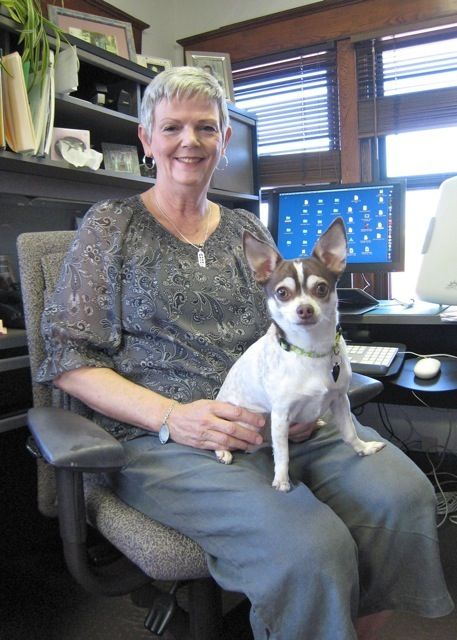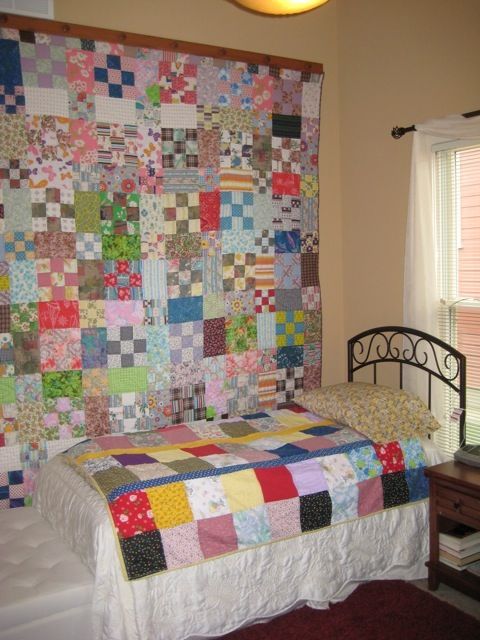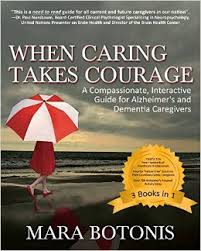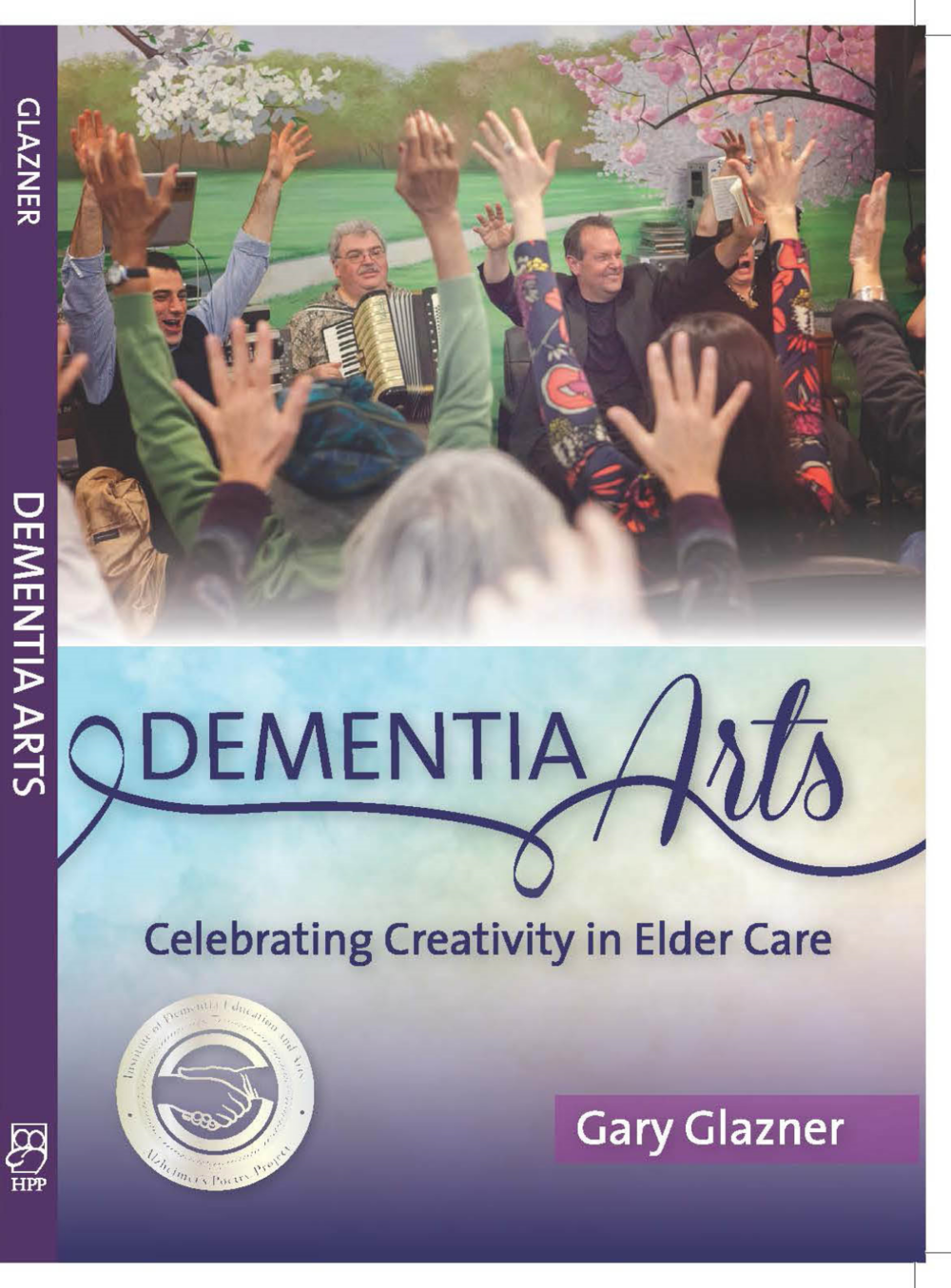Posts Tagged ‘inspiration’
Four Ways to Support Care Partners
We all know that wrenching feeling of wanting to support our friends who are immersed in being care partners but not understanding how best to help. Many of us know the feeling of being exhausted care partners and not knowing just how to ask for the help we need.
Mara Botonis, author of When Caring Take Courage, created a list of meaningful tips, captured in a note to friends from a care partner. I really appreciate her empathetic yet practical outlook and wanted to share a few of her ideas with you.
The Present in the Present
I so appreciate you wanting to help me, I don’t always have time to read a book, watch a movie, or accept your generous invites to restaurant meals or spa treatments. The best gifts save me time and energy and are a treat I can enjoy at home without arranging care. I would love a visit that includes a pre-made dinner we can share. Any of these thoughtful gifts would lift my spirits: a CD with my favorite songs, a favorite dessert or snack, a chance to play a favorite game with you, a soft cuddly blanket, or fresh flowers.
Write Me
Write me a note or an email. I can’t always talk on the phone or devote the time I’d like to an in-person visit. I’m usually only “free” to socialize when my loved one is sleeping and even then, I am alert to his needs. If you write to me, I can read it when I have time to truly enjoy it.
Share Memories
Reminisce with me. I willingly and lovingly put another person first for most parts of my every day. Sometimes I feel like big parts of me get lost so please remind me of our earlier times together. You may be the only one I get to do this with.
Please Stay in Touch
You don’t have to worry about saying or doing the right thing. I don’t always know what that is either. Please just keep trying. Don’t avoid calling or coming over because you may be feeling uncomfortable or unsure. I feel that way too sometimes and I’m here every day. Please don’t forget about me. I’m still here. I still love you. We still need and want you in our lives. Please reach out. There isn’t any way you can interact with me that would be unwelcomed or wrong. Just keep trying. #
After thirty years working in healthcare throughout the United States, Mara’s life was forever changed when a close family member was impacted by Alzheimer’s.
Please visit her website:
Website: http://www.whencaringtakescourage.com/
Deborah Shouse is the author of Love in the Land of Dementia: Finding Hope in the Caregiver’s Journey.
Rock with Rhymes that Resonate
The audience was quiet, partially because some of the people were slumped over in their wheelchairs, eyes closed. Gary Glazner stood in front of the group, wondering if he could engage them. He had received a grant to offer a poetry workshop in a memory care unit and he had carefully selected several familiar poems. He’d introduced himself to everyone and he was ready to inspire people through reading poetry. But were they ready for him? He took a breath and began.
“I shot an arrow into the air,” Gary said to the seemingly comatose group.
“And it fell down I know not where,” said an elderly man without even raising his head.
That was the beginning spark for Gary Glazner’s Alzheimer’s Poetry Project, a process he created to help engage and connect with those living with dementia through reading aloud and discussing poetry.
“There are four steps to the process,” Gary explains. “First, a call and response, where I read a line of poetry and the group echoes it. Then we discuss the poem. Next, we add props to the experience and finally, we create our own poem.”
A few of the familiar poems Gary uses include:
The Tyger—William Blake
The Owl and the Pussy Cat—Edward Lear
Wynken, Blynken, and Nod—Eugene Field
How do I Love Thee?—Elizabeth Barrett Browning
Purple Cow—Gelette Burgess
Jabberwocky—Lewis Carroll
Daffodils—William Wordsworth
His website, www.alzpoetry.com, is brimming with verse and rich with recommendations.
Gary has shared poetry with people living with dementia all over the world. His usual session lasts around an hour. He often centers his poems on a theme, such as Summer, Birds, Trees, or Food, and enriches the gathering with objects that engage the senses. For example, to supplement summer-time poetry, he might include a bucket of sand and a conch shell. He brings a misting spray to simulate an ocean breeze and lets people smell suntan lotion. For refreshments, he suggests fresh strawberries, lemonade, popsicles, or homemade ice cream. This four-step poetry process also works at home with just two care partners
“Poetry goes beyond the autobiographical memory and offers care partners a way to communicate with someone who has memory loss,” Gary says.
Good news for the Kansas City area: Gary is doing a poetry workshop here in early October. For more information, contact Deb Campbell at kcseniortheatre@gmail.com
For more information on Gary and the Alzheimer’s Poetry Project, visit www.alzpoetry.com
Gary’s book is a great resource: Dementia Arts: Celebrating Creativity in Elder Care
Deborah Shouse is the author of Love in the Land of Dementia: Finding Hope in the Caregiver’s Journey.
Creative Splashes
Sometimes I am around many creative people and I soak up their energy and ideas. Other days, I work alone. On those solitary days, I use these quote to inspire and ignite my creative spirit.
“We have to continually be jumping off cliffs and developing our wings on the way down.” ― Kurt Vonnegut
“To be creative means to be in love with life. You can be creative only if you love life enough that you want to enhance its beauty. You want to bring a little more music to it, a little more poetry to it, a little more dance to it.” ― Osho
“There is a vitality, a life force, an energy, a quickening that is translated through you into action, and because there is only one of you in all time, this expression is unique. And if you block it, it will never exist through any other medium and will be lost.” ― Martha Graham
“The creative is the place where no one else has ever been. You have to leave the city of your comfort and go into the wilderness of your intuition. What you’ll discover will be wonderful. What you’ll discover is yourself.” — Alan Alda
Deborah Shouse is the author of Love in the Land of Dementia: Finding Hope in the Caregiver’s Journey.
The Balm of Laughter: Bringing Light to Dark Thoughts
On the stage, a lavish musical was unfolding, complete with booming orchestra, bold singers, and catchy choreography. I was watching the action but my mind was on a move we’d recently seen, Still Alice, which featured a brilliant 50-year-old woman with early onset Alzheimer’s. More accurately, I was analyzing what I would do if I had Alzheimer’s: the note I might carry around, asking for people’s kindness and patience if I should repeat myself or get lost … or I worried about the burden on my children and wondered if there would be a point where I’d want to die. Then I thought about my mother: even when times were really tough and sad with my mom, I never wanted her to die; I never wanted to be without her company. Then I … Well, you get the idea; instead of enjoying a light-hearted Broadway road show, I was stirring up negative energy and stewing over uncertainties outside of my control.
At intermission, I reported these morbid thoughts to Ron. He listened carefully, then said, “Well, at least you can get a book out of this.”
I looked at him blankly. “What book?”
He looked right at me. “Well, instead of Still Alice, you can write Used to Be Deborah.”
I burst out laughing; Ron laughed, and I was back in the present.
Ron’s comment had reminded me of one of my dad’s favorite jokes.
Warning: this joke is really not that funny but it stuck with me.
A man wanted to find out the meaning of life. He climbed a high mountain and consulted a guru; this sage man told him he needed a daily chanting and meditation practice. Every day, he needed to sit on a meditation cushion and first chant, “Sensa, Sensa, Sensa. “ for one hour.
Then he needed to intone, “Huma, Huma, Huma” for another hour.
The man did this and after two weeks of feeling more frustrated than enlightened, he returned to the guru and said, “It isn’t working. I’ve had no revelations and the whole exercise is about to drive me crazy.”
The guru stroked his white beard (My father’s gurus frequently sported long white beards) and contemplated for what seemed like 400 hours. After 30 interminable minutes, he said, “Well, my son, you are now ready to put these two sacred chants together. First one, slowly, then the other slowly and build up to where you’re saying the hallowed words quickly, one after the other.”
The man hurried home, relieved to have a new assignment.
He intoned, “Sensa.” Then he chanted, “Huma.”
Faster and faster he chanted, until the two words blended into the true meaning of life, “Sensa Humor.”
How do we keep our “Sensa Humor” in the midst of uncertainty and chaos?
For me, it’s glorious groaning puns, wise and witty friends, and a willingness to laugh. How about you?
Deborah Shouse is the author of Love in the Land of Dementia: Finding Hope in the Caregiver’s Journey.
Marching Forth on March 4th
“What is the only day of the year that commands you to go forward?”
This was the riddle printed beneath the cartoon that cradled the fragrant pink piece of Dubble Bubble chewing gum. I sucked up the sweet gum juice as I read the answer: March Forth. (March Fourth.)Then I proceeded to practice the art of blowing a bubble within a bubble. But that vital bit of gummy trivia stayed with me.
March Fourth always seems like an important date, an unsung holiday.
I tried everything in my power to encourage my first daughter, due on March 7, to emerge on that auspicious day, including taking a long walk and going on a bumpy Jeep ride. Alas, she lingered until the fifth.
Now, I celebrate the day by creating a collage that proclaims how I want to March Forth through the year. This collage may sing with travel photos or contain inspiring words or picture a best selling book or depict meaningful family relationships:I try to put my vision for my higher self on the page.
As part of this year’s March Forth, I have gathered some quotes that inspire and guide me and that I’ll be using to go forward during 2015. Here’s to Marching Forth towards living your life’s purpose.
Deborah Shouse is the author of Love in the Land of Dementia: Finding Hope in the Caregiver’s Journey.
Four Reminders to Enjoy the Moment
Every week, I have the joy of interviewing a couple and learning their love story. We talk about where and when they met, what they like about each other, and how they stay connected during life’s chaos and challenges.
Recently, I talked to a couple who met in their late seventies. Both had lost their spouses and both were amazed to fall in love again. When I asked how they kept their relationship strong, she answered, “Because of our age, we know we don’t have that much time left to be together. We enjoy every moment of every day.”
Since that conversation, I have thought often about her words: What would it be like to truly appreciate every moment? What would it be like to completely appreciate each person I spent time with?
Being present and appreciative were two of my goals when I spent time with my mom in her later years. One moment, I felt connected, holding Mom’s hand, sitting right next to her while pointing out interesting pictures in a magazine, and the next moment her head would be lowered, her energy drained and I felt alone and sad. But of course, I wasn’t alone; I was right next to my mother, still holding her hand. My task was to enjoy that quiet minutes as much as the time that Mom was interacting with me.
“Enjoy every moment of every day.” These quotes echo that important reminder .
Deborah Shouse is the author of Love in the Land of Dementia: Finding Hope in the Caregiver’s Journey.
Many a Quote to Keep us Afloat
Please God, Please, don’t let me be normal!”
When I was growing up, my friend Susan and I often chanted this line from the Fantastiks. For us, normal meant mundane and we envisioned ourselves living daringly on the creative cusps.
During my time as a family caregiver, I often yearned for more of that mythical “normal.” Yet, I also wanted to be connected to my creative spirit. These are some of the words of wisdom that I used for infusions of inspiration. I’d love to hear from you: what quotes keep you afloat?
“Be recklessly generous and relentlessly kind.” Pam Grout
“It’s never too late to be what you might have been.” George Eliot
“May all beings be happy. May all my thoughts, words and actions contribute in some way to the happiness of all beings.” Lokah Samasta Sukhino Bhavantu:
These two quotes remind me to open my heart and dream.
“My great hope is to laugh as much as I cry; to get my work done and try to love somebody and have the courage to accept the love in return.” Maya Angelou
“Twenty years from now you will be more disappointed by the things that you didn’t do than by the ones you did do. So throw off the bowlines. Sail away from the safe harbor. Catch the trade winds in your sails. Explore. Dream. Discover.” (Mark Twain)
Deborah Shouse is the author of Love in the Land of Dementia: Finding Hope in the Caregiver’s Journey.
Six Spiritual Practices For Living with a Diagnosis of Dementia
Normally, you can put my friend Vicki Stoecklin in any city and she will easily get her bearings. From Paris to Dubai to Marrakesh, Vicki is used to working in and making her way around foreign countries.
So, at age 58, when she started getting lost in her own city, she knew something was seriously wrong.
Vicki had been plagued with a series of chronic physical ailments and she figured she’d deal with whatever this new issue was.
But she was caught off when the neurologist said bluntly, “You have dementia.”
“What am I supposed to do?” Vicki said.
“Live your life,” he said.
Learning to Live with Dementia
Initially, ”living life” was a huge challenge. She had trouble remembering where she’d put things; her feelings were disoriented. She could no longer drive and or do simple math. Her vision played tricks on her: she saw black holes where there were none. And she felt isolated from her community and friends.
But Vicki had a wealth of inner strength and resources. When she told me about her spiritual practices, I was inspired and moved. Here are a few of the ideas she uses to center and care for herself.
Learning Self-Compassion
“I learned to have compassion for myself,” she says. “If I’m having a hard time concentrating on a book, I stop and do something comforting, instead of pushing myself.”
Using Family Treasures to Encourage Contemplation 
Vicki enjoys contemplating her grandmother’s hand made quilt, which hangs on the wall of Vicki’s meditation room. “She probably had Alzheimer’s when she stitched those squares together,” Vicki says.
Inviting out the Inner Artist
Vicki uses crayons, watercolors, and colored pencils to explore her own artistic process.
“My depth and visual perception is off, so my work is abstract,” she says. “I also find it meditative to color labyrinths and mazes.”
Opening the Heart to Spiritual Texts
Vicki has a number of trusted books she calls upon.
One favorite is Peace in the Storm: Daily Meditations and Prayers for Those Affected with Chronic Illness.
“This book has been a great support to me,” Vicki says. “It’s about finding your relationship with God during the challenges of ongoing illness.” Another book that spoke to Vicki was Proof Of Heaven by Eben Alexander, a neurosurgeon who writes about his near-death experience. She also frequently reads Psalms.
Praying With and For Others
Vicki has a small box that she puts little prayers in for her grandson and her daughter. She has become a chaplain at her church and often prays for others. She also finds comfort in using the 24-hour prayer service at Silent Unity
Documenting Her Life Story
She has created two memory books — one for her work and one for her life. “These books are also reminders of the many happy memories over my lifetime,” she says.
*****
Q 4 U
What are some ways you incorporate spirituality into your life?
If you’d like to contact Vicki, you may email her at Vicki vickiwhllg@aol.com


